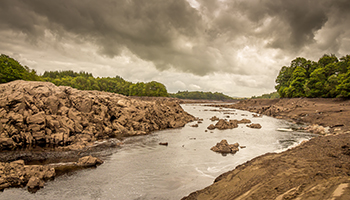Understanding and Managing Environmental Change
We investigate the Earth’s environmental systems, their interconnected processes, past histories and possible futures.
Our fundamental research on freshwater environments, their limnology, ecology and geomorphology is world-leading and emphasises the interactions between biotic and abiotic components for local and global processes, including carbon cycling. We use field monitoring, laboratory experiments and numerical modelling to work on these and other aspects of environmental processes and change, including generation of global dust, Arctic sediment yield, and long-term landscape erosion.

Understanding the history, present and future of sand dune systems
Jonathan Millett’s Royal Society Leverhulme Trust Senior Research Fellowship explores how changes in the environment, such as climate change, impact sand dune habitats. His research uses unique long-term datasets gathered at Ainsdale Sand Dunes National Nature Reserve in Merseyside. These include data collected as part of Ainsdale Dune Slacks Long Term Experiment, which has been established for nearly 50 years, making it one of the longest-running ecological experiments in the UK.

UKRI Future Leaders Fellowship Extended
Kate Mathers has been awarded a further £590K by UKRI to extend her successful £1.1m Future Leaders Fellowship (FLF) for a further 3 years. Working alongside the Environment Agency, Scottish Environmental Protection Agency and the River Restoration Centre Kate Mathers’ now 7-year project, “Stuck in the mud: addressing the fine sediment conundrum with multiscale and interdisciplinary approaches to support global freshwater biodiversity” is contributing state-of-the-art insights that will allow stakeholders to effectively use resources, monitor and manage UK riverine ecosystems to produce optimal conservation and restoration plans.

50 years of Litter on Skye
Tom Stanton and team are researching new techniques for mapping polluted beaches, including with drones, to see if the true extent of the rubbish can be measured. Their work features in a new film “50 years of litter on Skye” which follows the team as they discover isolated beauty spots such as Camasunary that are carpeted in plastics and discarded fishing equipment. Working closely with local groups, the team of scientists continue to visit the island’s remote shores to analyse the extent of the litter washed up by ocean currents.

Anthropogenic alteration of nutrient supply increases the global freshwater carbon sink
Wolfson Research Merit Award holder John Anderson’s work on global biogeochemical cycles has produced global assessments of carbon sequestration in aquatic systems showing that lake carbon burial offsets 20% of global freshwater CO2 emissions.

